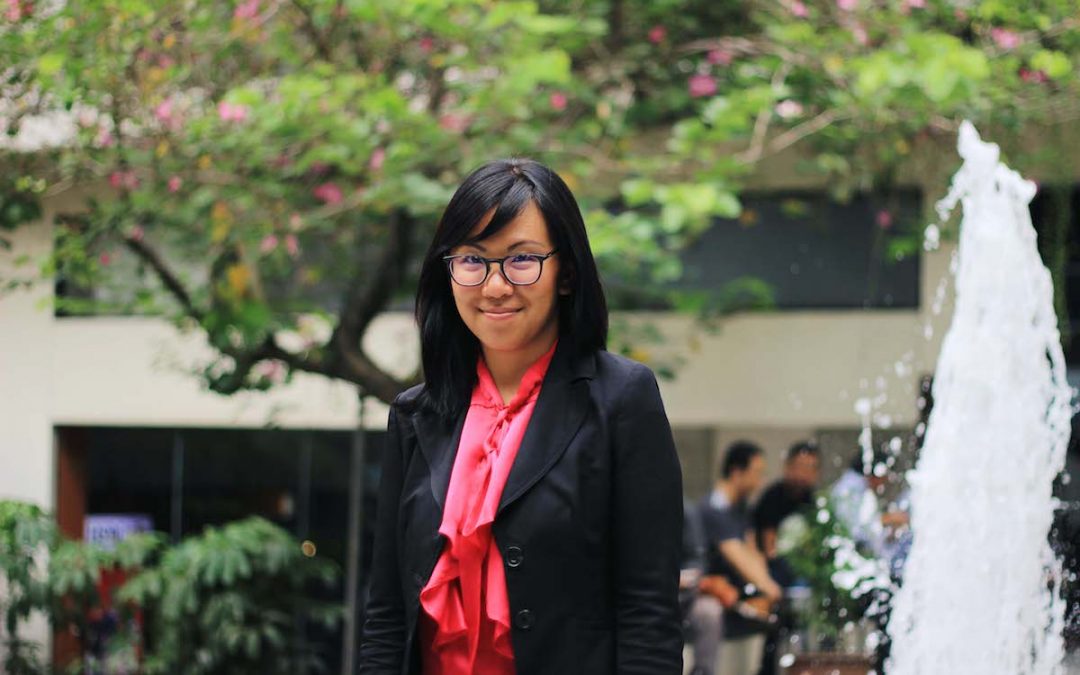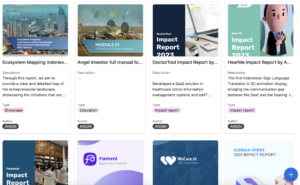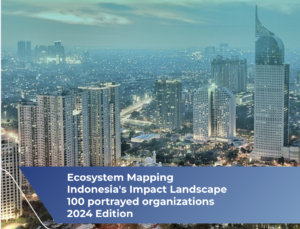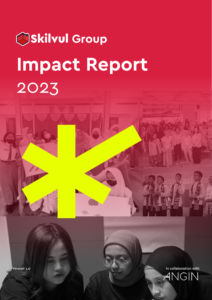Tell us a bit about yourself.
My name is Elsa Dewi Santika. I’m working for an organization called Luminocean. It is an educational ecotourism organization based in Banda Neira, Maluku that I set up with my business partner – Mareike Huhn from Germany. We started it in November 2014; it’s been 3 ½ years of a journey for us.
Can you talk more about Luminocean? How did you get started? What was your inspiration behind it?
Well, it started when I was in Banda Neira, in September 2013. I had come to Banda Neira to do humanitarian activities, bringing donations from Jakarta, Singapore, and Malaysia and distributing it to remote islands in Indonesia. When I arrived in Banda Neira, I came across a dive center owned by a German, who was also a dive instructor. I learned diving from him and fell in love with the place. When I found out that they have an NGO set up by a few Germans in marine conservation, I signed up as a volunteer to work at the NGO and stay in Banda starting from Feb 2014 until October 2014.
While I was there, I had this idea: Why not start a self-sustaining organization, rather than an NGO which relies on donations? An entity that has its own business model. I was inspired by Blue Ventures in Madagascar, which provides a scuba diving internship for the purpose of conserving the environment in Madagascar. I brought this idea to my friend Mareike. She agreed and said “I also have the same idea – why not do it together?” It was actually born as Sea Ventures, but we changed it to Luminocean in 2017. So yeah. After some brainstorming, Luminocean was born.
Can you describe what social impact Luminocean seeks to achieve and how you go about achieving it?
So I think there are a few types of impact. First, we want to create environmental awareness for the people, especially for the local people. In Banda, the Bandanese – they live from the sea. However, they do not know how to take care of the creatures living in the sea such as coral reefs and the fish there. There’s so much plastic trash in the ocean in the Banda Sea. And every year there are certain religious traditions where plastic ends up being thrown away – into the sea, into the water. We want to help educate locals in Banda to not throw the plastic waste into the ocean.
In addition, we want to create environmental awareness for the international community. There are a lot of scuba divers – tourists from Europe that come to Banda. However they just dive for fun without thinking much about the environment. So we want to create another product, where diving is not only for fun but meaningful as well. For instance, you can learn about the coral reefs. You can participate in scientific research. We work together with some universities – one from Germany, another from Australia, and local universities in Indonesia. We bring scientists and projects to Banda and we offer these projects as part of a package of scientific diving to these international divers. That way, they can come to Banda not only for recreational diving but also for environmental and scientific diving. The revenue that we get, we channel it to environmental education as well as English and computer literacy to the Bandanese people.
You mentioned that your passion is in environment and education. How can the private sector go about addressing education and making a difference in people’s lives?
Basically, education in Indonesia is already established, you know. The mainstream education. However, the private sector can contribute on top of mainstream education in terms of more practical education. For example, the voluntourists we bring to Banda can interact with the local kids. Kids can learn in terms of practicing their English with the tourists, or other skills like computers. At the same time, these children can also learn diving. In the future, these kids – upon graduation – can work in the diving or tourism industries.
More and more tourists are coming to Indonesia and to Banda Neira every year, and I want this next generation to be prepared and to be equipped with the necessary knowledge and skills, and therefore be independent and self-sustaining. In remote islands because of the lack of jobs and opportunities, they might just want to be a civil servant or teacher when they graduate. Or maybe those who lack opportunities, they think they can only be fishermen or do some labor work, which only gives them a very minimum amount of salary. But in the tourism industry, there is a huge chance to earn more than just being a fisherman or laborer.
Based on your experience, have you noticed any difference working with girls in education? Are there different issues?
From my experience, girls are more motivated than the boys (laughs). I ran this English course – 3 girls 2 boys. The girls were much more motivated than the boys – the boys were still playing.
The challenge for Banda is that it’s still quite a traditional society. Girls are expected to behave in a certain way – it’s not liberating. It’s not good for the independent kind of thinking that we want the girls to have. We want the girls to be educated and to be independent, not to only think, “Oh I want to get married after I graduate,” because of obligation, but to postpone the marriage and to do something that they want first, to be something that they want first before finding a spouse and having a family.
How do you kind of go around that traditional mindset? How do you convince girls or their families that they can pursue their goals rather than immediately start a family?
At the moment we cannot force people to change their mindsets, especially in the short term. What we can do is work with others who are more open-minded. Some people allow their daughters and children to work with us. Some people do not. So we choose to work with people who allow their daughters to work with us. However, we hope that in the future we can bring some changes – we can open the mindset of the people and show them that working with outsiders – foreigners including me (in the Bandanese point of view, I am a foreigner even though i’m Indonesian) – is fine and can bring benefits as well.
What challenges have you faced, being a woman in the startup ecosystem?
Well, I mostly faced challenges from my own parents. They have these expectations of me working in big cities – in Jakarta, or…because I used to study and work in Singapore, they expected me to be more oriented towards more “developed” countries or cities. However, me choosing to work in more remote islands was pretty challenging because they didn’t really agree with my idea. I think that was the biggest challenge I faced at the time.
What are some tips you can give women entrepreneurs going into a room full of investors, who are often all-male?
Just be confident. As long as you know what you’re doing, it doesn’t matter if you’re male or female. Even if you’re male – if you don’t portray that self confidence, people will sense you don’t know what you’re doing. Investors will have that sense as well. But if you’re sure and full of self confidence, people will feel that. Know what you’re doing.
Any advice for other women entrepreneurs who might want to start up a venture?
My advice is just do it. Sometimes we think too much – you see there is this thing called analysis paralysis. We think too much, about how we can earn money from a startup, how we can survive. I didn’t think about any of that at the time of starting Luminocean. I was pretty naïve (laughs). Looking back, I probably would have thought if over 2-3 times more. But I think if you’re passionate about something enough, you should just do it. And everything will fall into place if you just do it.
What’s your advice for overcoming doubts or doubters – for example parents, a spouse, or other naysayers?
Starting from where you are is also a good idea — not making a big change, because people – parents, spouses, children – might not react well to sudden change. Starting where you are is so good.
However, if there is a calling in which you have to go somewhere else, where you have to make big changes – I think it is important to have a support system. Maybe a group of people who also have the same ideas who share the same passions. If there are two or three or more people who can walk with you, it is more fun and more bearable. It becomes easier to brush off those negative voices that come your way.





